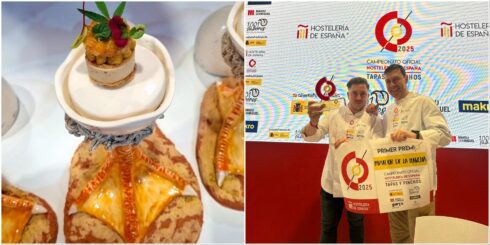THIS Costa del Sol bodega is the first to legally sell wine aged underwater by teaming up with a local shellfish farm.
Escaramujo Wines and Frutos del Mar have worked together to become the first underwater winery licensed by the Spanish Food Health Agency (Aesan).
The Olive Press went on a tasting tour and we found ourselves jetting out of Estepona port on a clear, sunny day in December.
I couldn’t think of a better way to spend my Saturday morning than sipping wine while learning about this unique venture.
The winery was born in 2021 when Dutch aquaculture engineer Khwame Paloeloe Helder, also known as Palu, met Spanish wine expert Victor Gomez.

Photo: The Olive Press
Gomez had discovered underwater wineries in Galicia but it wasn’t until a chance meeting with Helder that his idea to create Spain’s first licensed underwater bodega began.
The Dutchman was already experimenting with submerging wine bottles in his 25 hectare farm in the Mar Alboran to deter barnacles from attaching to his scallops and oysters.
He discovered the pesky crustaceans loved the smooth surface of wine bottles and left his shellfish alone.
Later, meeting Gomez was the perfect opportunity to combine business interests and create an innovative new venture.

Photo: The Olive Press
Underwater wine ageing first gained traction in 2010, when a 19th century French shipwreck was discovered in the Baltic Sea.
Among the wreckage were an extraordinary 186 intact bottles of champagne, believed to be a gift from King Louis XVI to Tsar Peter the Great.
Not only had the bottles survived OVER 170 YEARS underwater, but the wine’s quality had not been affected.

Photo: Proceedings of the National Academy of Sciences
According to the scientific journal, the Proceedings of the National Academy of Sciences (PNAS) the sea’s darkness and constant temperature helped to preserve it, sparking a new vanguard in wine ageing.
Off the coast of Estepona, the Mar Alboran provides optimum conditions thanks to its low temperatures and luminosity.
Escaramujo gained its health license in 2022 after jumping over much red tape and selecting wines from top Spanish vineyards to submerge for further aging.
The current rocks the bottles and promotes fermentation, leading to a creamy feel in the mouth with a slightly higher alcohol content and less sugar.

Photo: The Olive Press
And as if that wasn’t enough, Gomez claims the wine gives you less of a hangover with no headaches.
“People think this is just a trend but it’s a very different way of creating wine,” Gomez said.
“It’s a very natural technique which rewards you with a more refined outcome.”
While a bottle of wine costs a little more than some might want to spend at €100 (and local honey mead clocks in at €90), just 1,000 bottles are fermented per year.
After the 11 month aging process is finished, Helder and Gomez personally dive some 20 metres below the surface to collect the bottles by hand.

Photo: Escaramujo Wines
After being extracted, the wine is beautifully adorned with corals, barnacles and shells, a process which is not just aesthetically pleasing, but excellent for marine life.
Gomez explains that the barnacles are natural water filters, making it much cleaner where the wine is fermented.

Photo: Escaramujo Wines
This attracts a myriad of species, including the endangered pinna nobilis mussel, which is collected and sent to conservation organisations.
To humanely dispose of the barnacle meat, the bottles are submerged in fresh water until the barnacles die, at which point they are put back into the sea and eaten by snails, crabs and octopuses.

Photo: Escaramujo Wines
The excellent water quality is also the perfect environment to breed Helder’s specialities: flat oysters, zamburiñas and vieiras (two types of scallops).
Though as a vegan I could not sample the delicacies myself, my brother, who declared he didn’t like shellfish before the trip, was happily gobbling down the ‘delicious’ morsels.

Photo: The Olive Press
Such was his delight that it even tempted a fellow veggie to try a zamburiña scallop, albeit garnished with garlic and grapes.

Photo: Escaramujo Wines
“It’s not just wine and seafood, it’s an experience and we’re creating memories,” said Gomez.
Despite my absolute lack of knowledge about shellfish, I came out of the two hour boat cruise feeling like an expert.
Helder, a marine biologist, is deeply passionate about his work and has hundreds of interesting facts to share.
Gomez meanwhile is clearly enamoured by wine and explains the aging process in a clear and engaging way.
To book a tasting or purchase a bottle, contact Escaramujo Wines through their website or email: escaramujowines@gmail.com.
If you fancy shellfish, contact Frutos del Mar on their website, or email: info@frutosdelmar.es.









